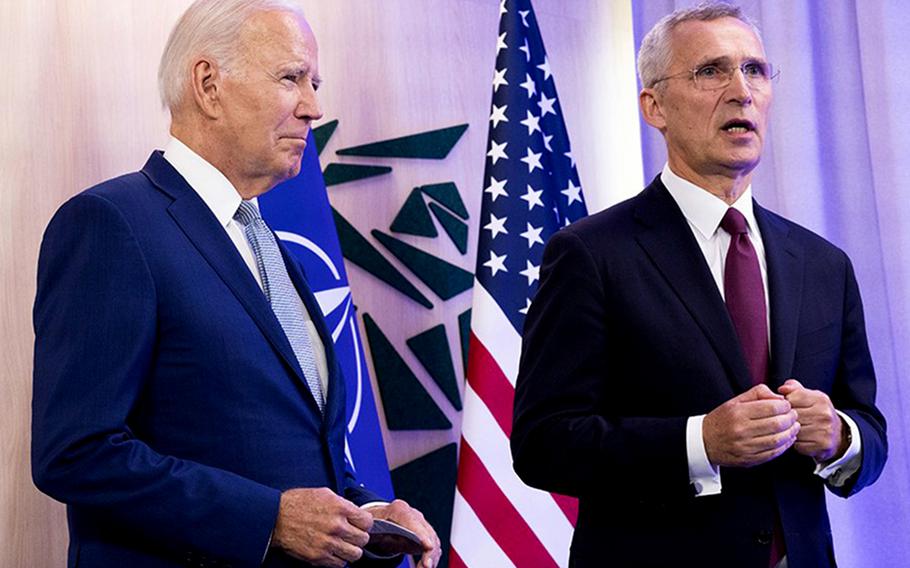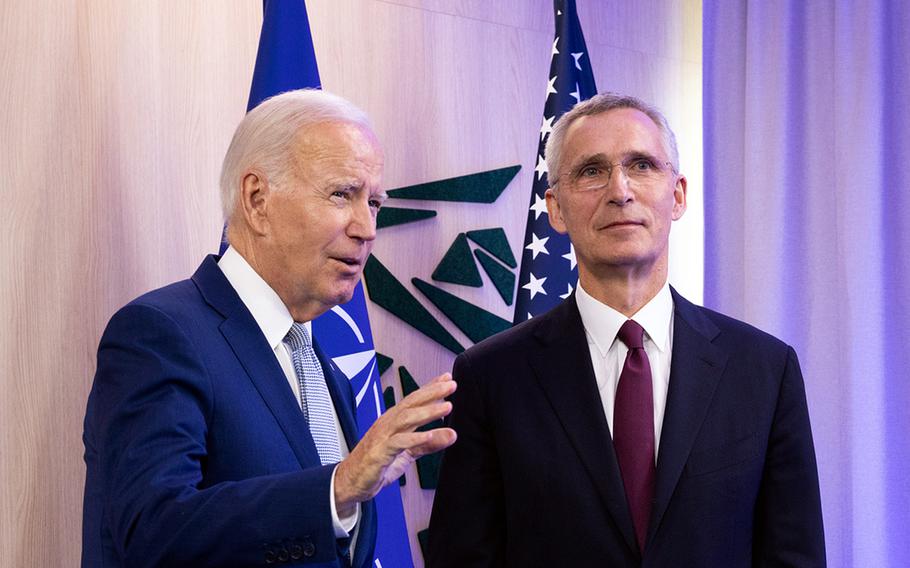
U.S. President Joe Biden, left, listens to remarks by NATO Secretary-General Jens Stoltenberg on July 11, 2023, before the start of the alliance's summit in Vilnius, Lithuania. ( NATO)
Ukrainian President Volodymyr Zelenskyy on Tuesday blasted NATO for waffling on his country’s future membership, saying prior to joining an annual summit that the alliance’s weak commitment to Ukrainian accession treats Kyiv as a chip on the negotiating table with Russia.
Zelenskyy’s comments came as President Joe Biden joined allies in Vilnius, Lithuania, for high-level talks about Ukraine’s future.
“It seems there is no readiness, neither to invite Ukraine to NATO nor to make it a member of the alliance,” Zelenskyy said in a statement on his way to the annual gathering of world leaders. “This means that a window of opportunity is being left to bargain Ukraine’s membership in NATO in negotiations with Russia. And for Russia, this means motivation to continue its terror. Uncertainty is weakness.”
Zelenskyy’s comments put him at odds with Biden, who endorsed NATO’s new language on future membership for Ukraine.
NATO has been hard at work trying to craft a statement on Ukraine’s eventual accession, but the ongoing war stands as a major obstacle in the way of setting the kind of clear timeline that Zelenskyy was seeking.
“We agree on the language that you proposed relative to the future of Ukraine being able to join NATO,” Biden said Tuesday while speaking alongside NATO Secretary-General Jens Stoltenberg.
Despite his criticisms, Zelenskyy said he will be on hand Wednesday in Vilnius for the inaugural meeting of the newly formed Ukraine-NATO Council, where the issue of future membership will be hashed out.

U.S. President Joe Biden, left, speaks July 11, 2023, before the start of the NATO summit in Vilnius, Lithuania, flanked by NATO Secretary-General Jens Stoltenberg. (NATO)
Details about the agreement are expected to be unveiled after those talks. NATO membership comes with a security guarantee of mutual defense, so allowing Ukraine to join while it is at war would essentially make the U.S. and the 30 other allies combatants in the conflict.
For that reason, Biden and Stoltenberg have emphasized that membership in the near term is an impossibility.
Following talks Tuesday, the alliance also detailed various democratic and military reforms required to join the pact.
“NATO will support Ukraine in making these reforms on its path towards future membership,” an alliance communique stated.
The dispute with Zelenskyy cast a shadow over events in Vilnius, even as NATO celebrated a breakthrough on the eve of the summit when Turkish President Recep Tayyip Erdogan said Monday that he will stop blocking Sweden’s entry into the alliance.
On Tuesday, allies continued to talk up their support for Ukraine, with officials repeating the standard talking point that allies were in it for the long haul. But on the sidelines in Vilnius, there was concern about Ukraine’s slow-going counteroffensive.
Petr Pavel, the newly elected president of the Czech Republic and a former top NATO general with deep ties to the alliance, gave a blunt assessment about the stakes involved as Ukraine pushes to regain territory.
“Realistically, the window of opportunity will more or less close by the end of this year,” said Pavel, who served as the head of NATO’s military committee between 2015 and 2018.
Pavel said that as the war drags on, there eventually will be a decline in public support for continuing to arm Ukraine. Upcoming elections in the U.S. and elsewhere also could reshape the situation, he said.
“Whatever is achieved by the end of this year will be the baseline for negotiations,” Pavel said.
Pavel’s comments amounted to a rare, unvarnished public assessment that is at odds with how NATO and U.S. officials usually talk about the conflict.
They contrasted with Stoltenberg’s remarks at the start of the summit.
NATO will send “a clear message to Ukraine that we stand by Ukraine for as long as it takes and expect allies also to reiterate their commitment to provide military support to Ukraine to help them liberate more land,” Stoltenberg said.
Ukraine has faced stiff resistance during its counteroffensive, which is still in the early stages. A question for allies is whether enough weaponry has arrived quickly enough for Ukrainian troops.
Low ammunition supplies and lack of airpower and mine-breaching equipment have added to Ukrainian forces’ difficulties, Pavel said.
Nevertheless, Ukraine is making gradual gains and still hasn’t committed “major forces” to the offensive, Pavel said, apparently in reference to Western-trained brigades that are yet to enter the fight.
In a move aimed at strengthening Ukraine’s ability to strike deeper against enemy positions, French President Emmanuel Macron on Tuesday announced a decision to send long-range cruise missiles that can travel about 150 miles.
While Ukraine has dominated the agenda in Vilnius, allies took other steps Tuesday that focused on enhancing their own defenses in Europe.
They agreed to regional defense plans involving a new NATO force structure that calls for tens of thousands more troops to be able to deploy more rapidly in a crisis.
“This is really the foundation of a very, very important rebuild of our collective defense system,” U.S. Army Gen. Christopher Cavoli, NATO’s supreme allied commander in Europe, said on the summit sidelines.
Allies haven’t had such detailed defense plans for Europe since the Cold War.
Dutch Adm. Rob Bauer, the head of NATO’s military committee, said allies now need to put the new defense plans into action. A key assumption of the strategy is that Russia will seek to reconstitute its military, which has been badly damaged during the war in Ukraine, he said.
“There is a little bit of time. That’s the good news, because Russia is not as good as they were at the start of the war,” Bauer said.
The days of imaginary adversaries in NATO military drills and exercises, as well as wariness about provoking or singling out Russia as the threat, have long since passed, he added.
“No fictitious scenarios anymore,” Bauer said. “We talk about Russia as a threat in these scenarios.”